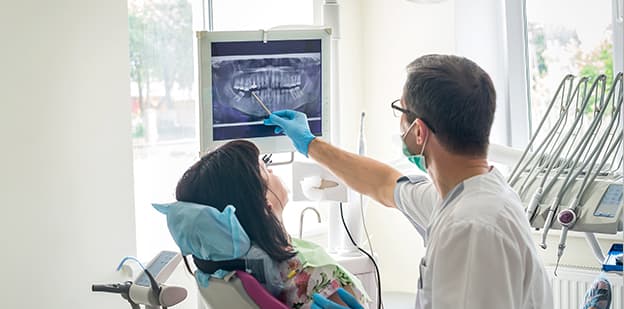Going back to school after having braces placed in your mouth can be a little scary. It’s not just the social factors that may have you freaked out—but what are you supposed to do when you enter the school cafeteria? Not all the meals that they’ve got prepared on a day-to-day basis are made for those with braces! Don’t worry! Dr. Thomas C. Sonneveld and his amazing staff have encountered this feedback from other patients before. In fact, they’ve already got some tips ready to help you during lunchtime throughout the school year that will help you adjust easily to your braces.
What Not To Eat At School
Alright so, as previously mentioned, not all school lunches are braces-friendly. Here are some good rules to follow when preparing your own packed lunch or eating at school:
- Stay Away From Hard Foods – Munching on ice, apples, carrots, corn on the cob are not a good idea because it can result in a busted bracket or a popped wire! Look for other substitutions such as soft fruits like grapes, melon balls, and watermelon or soft vegetables like steamed broccoli, mashed potatoes, or sweet potato fries!
- Avoid Sticky, Chewy, And Sugary Foods – Essentially, stay away from candy. Not all candy—just most candy. Not only is the sugar bad for your overall diet, but typically candy items are not good for your braces. Examples of sweets that you should avoid are licorice, gum, caramels, taffy—basically anything that stretches and has a gummy consistency that can get wrapped and caught in your braces. Examples of candy that we recommend to curb your sugar-cravings (in moderation) are softer non-gooey candy like Kit Kat bars or chocolate bites like Hershey’s or Dove’s chocolate bars that break into little squares and don’t have caramels or nuts.
- Abstain From Foods You Bite Into – Whenever you bite into a certain food, the pressure from the food push on your brackets and wire. This may not cause a pop the first time, but it will ultimately cause a component of your braces to be dislodged. Examples of this would be sandwiches, bagels, rolls, cookies, pizza, etc. We suggest cutting your food with a knife and fork and placing the pieces into your mouth—like cutting up your pizza, making small sandwich bites, or breaking off pieces of your cookie before placing it into your mouth. This will save you a painful and embarrassing scene in the cafeteria, or an emergency appointment with your orthodontist!
Prepare An Oral Hygiene School Kit
Brushing and flossing is important for everyone to perform in order to maintain good oral hygiene, however, it takes a little more work when you have braces. Braces are a dental treatment that are meant to improve your oral health and better your smile, but this oral device annoyingly traps more food between your teeth than before. Trapped food is not only irritating—it can also get in the way of your social life at school. Get around this annoyance by creating an oral hygiene school kit! Buy yourself a cool bag and fill it with the following helpful dental tools:
- Regular Toothbrush – Brush your teeth after every meal. If you’re having breakfast and/or lunch at school this tool will be extremely helpful!
- Interdental Toothbrush – Brush your teeth with this toothbrush if you feel like your regular toothbrush isn’t reaching a place in between your teeth and braces that is irritating you.
- Toothpaste – Choose a toothpaste that doesn’t have teeth-whitening properties! You don’t want to finish your orthodontic treatment with whiter teeth surrounding the part of your tooth that was covered by your brackets.
- Mouthwash (travel-sized) – Be sure to choose a mouthwash that contains fluoride so that it can strengthen the enamel of your teeth. The pressure of swishing this solution can help dislodge little bits of food that you missed. Another plus! Fresh breath!
- Floss – Flossing is necessary to not only maintain tooth health, but, more importantly, gum health! Make sure to floss after every meal—even during the day!
- Floss Threader – Since you have braces, this tool will be extremely helpful to get the floss in between your teeth in a more easy and efficient manner!
- Ortho Wax – Getting your wires tightened or the addition of bands can move your brackets to a different position in your mouth where continued rubbing on your cheek can cause irritation or inflammation and therefore pain and sensitivity. With orthodontic wax, you can coat your brackets and reduce or relieve the pain that you’re feeling on your cheek.
- Tylenol (anti-pain medication) – Ask your parents first if you can have this medication with you! Having an anti-pain medication can be helpful though, for obvious reasons.
- Aleve (anti-inflammatory) – Again, ask your parents first if you can have this medication with you! Having an anti-inflammatory medication can be helpful to reduce swelling and therefore reduce sensitivity in your gums and cheeks.
Contact Your Orland Park, IL Braces Expert!
We hope with all this information, you’ll start to feel more relaxed and confident about what you should pack for lunch or the types of food you can select from the school cafeteria. Although we understand that having teen braces and taking care of them is a large undertaking, we want you to feel like we are here for you every step of the way with helpful guidance and tips! If you want straighter teeth and want to try an easier treatment, try asking your parents and Dr. Sonneveld to check and see if you’re a good candidate for Invisalign Teen! If you have any other questions give us a call at (708) 403-2626 or have your parents request an appointment online.
 708.403.2626
708.403.2626


